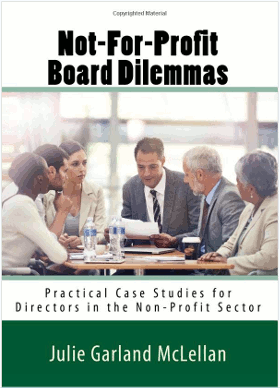Book review - Not-For-Profit Board Dilemmas

Reviewed by John Brogden, Former MD & CEO of the Australian Institute of Company Directors, Chairman of Lifeline Australia, UrbanGrowth NSW and Furlough House Retirement Village.
"All Directors are leaders, whether in the private, public or not-for-profit space. All organisations look to their boards for direction, mentoring, support and advice - adding tremendous value to the professionalism of organisations. NFP directors are in a unique position. They are advocates of their cause and many also contribute to their organisations on a volunteer basis outside their role as a board member. What is vital though, is that these directors understand their legal obligations as custodians of their organisation. I congratulate Julie Garland McLellan on successfully highlighting the importance for directors, specifically NFP directors, to practice good governance across all aspects of their organisation in her series of relatable and honest case studies."
Available in Paperback or Ebook from Amazon.com
Australian readers may prefer to purchase through the AICD website where members will receive a discount.
What's New - In September
 The greatest excitement of the past month was the news that I had been nominated for 'Influencer of the Year' for my work with NFP boards by Third Sector. As you can imagine, I was thrilled!
The greatest excitement of the past month was the news that I had been nominated for 'Influencer of the Year' for my work with NFP boards by Third Sector. As you can imagine, I was thrilled!
Much of my work with not-for-profit organisations is done on 'mates rates' (or free of charge) and it is lovely to be recognised for my contribution.
Another great excitement was attending, and presenting at, the Taiwan Corporate Governance Summit in Taipei. This is always a truly international event with leading governance experts from Singapore, USA, Taiwan, and other countries. Retired Justice Randy Holland gave an inspiring keynote address and the theme was on one of my favourite topics - educating non-executive directors. My presentation explored the link between director education, board composition, and corporate performance.
A trip to Kuala Lumpur to run a two-day course for governance professionals supporting (but not necessarily sitting on) boards was a perfect conclusion to a month that also included a few trips to Canberra, some TV interviews on board composition and gender balance, and my usual board meetings in Sydney.
Life is so much more enjoyable when you are busy doing what you love!
I am always keen to work more and will be delighted to hear from you if you would like to arrange a board strategy workshop, education session, or board performance review.
Just call me on the number below or reply to this email for a discussion of how I might help your board.
Inspirational quote for October - This month my favourite quote is:

Norman Augustine is the Former Chairman of both The American Red Cross and Lockheed Martin. I was very fortunate to meet him when I spoke at the NACD conference in Washington and have benefitted greatly from his insights.
A note on names - A few readers have asked me where I find the names for the protagonists in each case study; I 'borrow' them from people I meet or things that I read. Edwina is an English name. It means: Rich in friendship, or wealthy friend. It is derived from the Old English name Eadwine, meaning rich or happy, and friend. Edwina is indeed rich in friendly board members who bring a wealth f happiness to their board service.
This newsletter - If you have any ideas for improving the newsletter please let me know. If you are reading a forwarded copy please visit my website and sign up for your own subscription.
Suggestions for dilemmas - Thank you to all the readers who have suggested dilemmas. I will answer them all eventually. I could not write this newsletter without your help and without the generous help of all the experts who respond each month to the case studies.
Be a contributor - if you would like to attempt a response to the dilemmas for publication you will be most welcome. Simply reply to this email and let me know.
Let's connect - I use LinkedIn to share information about boards and directorship with my friends and acquaintances. If you use LinkedIn and we are not yet connected I will welcome a connection from you. You can find me at linkedin.com/in/juliegarlandmclellan.
Let me help you - If you would like me to speak to or train your board, staff, audience and/or group please contact me at julie@mclellan.com.au.
Farewell until the next issue (due 1 November 2018). I look forward to greeting you again then. In the interim I hope you will enjoy health, happiness and hard work.
Enjoy governing your corporations; we are privileged to do what we do!
Best regards,
Julie
 Edwina chairs a small not-for-profit company with about 35 staff and a very enthusiastic and committed board. Recently the company accountant left, and the CEO had just started the search for a replacement when the CEO had a fatal accident. The board stepped in to help.
Edwina chairs a small not-for-profit company with about 35 staff and a very enthusiastic and committed board. Recently the company accountant left, and the CEO had just started the search for a replacement when the CEO had a fatal accident. The board stepped in to help.
 Firstly the roles and responsibilities of a director should be clearly defined. These responsibilities cover the governance and developing and implementing strategy plans for the organisations.
Firstly the roles and responsibilities of a director should be clearly defined. These responsibilities cover the governance and developing and implementing strategy plans for the organisations. What a great problem to have, Edwina! A board that steps up and serves; you are right to want to reward them.
What a great problem to have, Edwina! A board that steps up and serves; you are right to want to reward them. When a small to medium non-profit is going through a crisis, it is not unusual to see a higher level of input from its directors.
When a small to medium non-profit is going through a crisis, it is not unusual to see a higher level of input from its directors.



